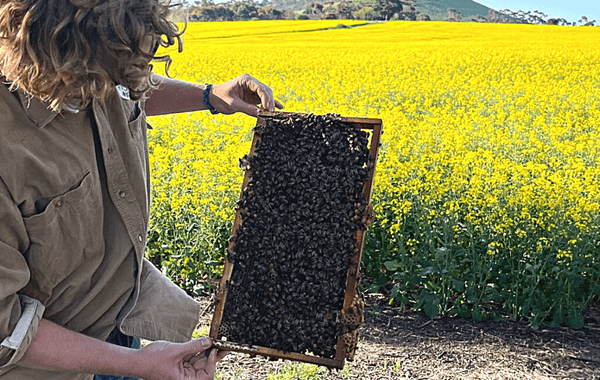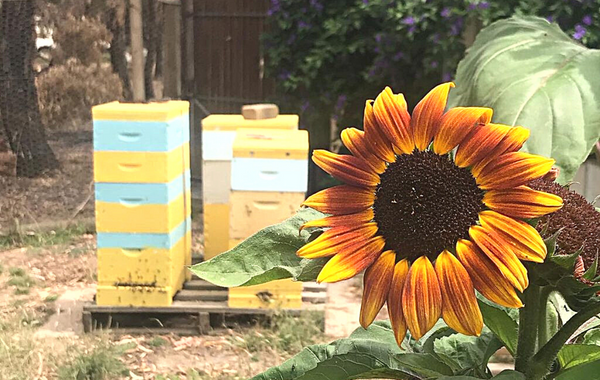The bee-friendly lifestyle
At this time of year, when flowering coastal tee trees cover the dunes and wildflowers line the roadside, 27-year-old beekeeper Thomas Earls stops to think about how it affects the bees and the honey.
“Living and working in this area means that I get to appreciate and enjoy the incredibly diverse natural environment of this coastline, observing the changes of seasons through the different native flowers such as the golden wattle in the winter through to flowering eucalyptus in the summer,” the Jan Juc local said.
“This provides native pollinators and honeybees with a great pollen and nectar source throughout the year, whilst providing delicious honey that gives this region a snapshot into each season in bloom.”
In 2020 Earls started his beekeeping business Coastal Nectar.
His mission is to create an environmentally responsible local business putting a modern twist on the 9,000-year tradition of beekeeping, while providing raw tasty honey to the Surf Coast community.
Earls has always been a passionate surfer, environmentalist and self-proclaimed honey addict, but when he set out to travel South America solo for two years, he never expected it would lead him to beekeeping.
It set the now 27-year-old on the path to become a beekeeper and educator.

Thomas Earls building trust with the bees in spring 2022, Photo: NIXON BEES IN ANAKIE
“In each country I went to I sampled and tried different honey in different regions, and I noticed the honey change in taste and colour in each area with the different plants, and I became really fascinated,” he said.
“There are so many types of honey out there, dark honey, light floral honey, thick honey, runny honey, and so on my travels I really got into it, and after a little while I found a cool opportunity.
“I had the option to volunteer with a beekeeper, get some fresh honey from the hive, work with him and shadow him and he taught me everything he knew, and in exchange I would help him out.”
Earls spent time with the beekeeper and within days had fallen in love with occupation.
“In a week I had a crash course in beekeeping,” Earls said.
“He threw me in the deep end, he didn’t want me to wear gloves, he really took me in the deep end and see how the queen operated and what makes a healthy colony.

“He had a very scientific approach to beekeeping, and I saw the art form in it, and that’s what I’m really trying to practise four years on from that experience.”
“He really lit in me this passion for how important bees are for the environment, and that there is really more to beekeeping that just honey; it’s actually an environmental practice with pollination, and an amazing awareness that comes with bee keeping of the surroundings.

“You’re aware of the native flowers and what the bees you work with will be visiting, and to research when different types of trees flower, and the nectar yield.”
When Earls returned home from his travels, he started with caring for one hive from his Bellbrae backyard.
“I had his words echoing in my head: Australia is in the golden age of beekeeping, we’re free of the majority of the pests and the bees here do very, very well on our amazing eucalyptus.
“So, with my one little hive… I learnt so much so quickly and I realised I wanted to expand.”
So Earls asked the community for help, giving them the opportunity to pre-purchase honey and beeswax in order to fund more hives and beekeeping equipment.
Initially Earls asked for $1,000, expecting to add one or two hives to his collection, but when he quickly raised $7,000 he was able to fund 15 more hives and almost immediately became a small scale honey producer to the Surf Coast.
“It all happened so quickly and I’m just grateful.”
Nowadays, Coastal Nectar is producing more than 400kg of small batch raw honey for the Surf Coast community.

Beyond beekeeping, Earls remains passionate about the environment and has expanded his work with Coastal Nectar to including education programs at primary schools about the important world of native bees and honeybees.
Earls spends each winter travelling to present and educate children at schools in Melbourne, Geelong and Sydney, as well as helping National Disability Insurance Scheme clients build bee-friendly gardens.
“I was being asked to attend all these school and wear my suit, and teach the children that bees aren’t scary and don’t want to sting you.”
“That’s probably been the main part of coastal nectar now.”
“In the past 12 months we have presented the ‘World of Bees’ school incursion to over 50 schools around Victoria, including visiting our closest Bellbrae Primary School for their Term 2 topic on Minibeasts.”
“A lot of these schools have been locally and in rural parts of Victoria, where I’ve had a great time seeing their veggie gardens and helping provide advice and bee friendly seeds to plant around their school.”
“I don’t want to be a big beekeeper only making money off the bees, education is more sustainable in my eyes.”
“I’ll be starting to do beeswax candle kits for schools soon too.”
In July 2022, Coastal Nectar finished second at the Australian Rural Business Awards for our education programs and incursions.
But the importance of education doesn’t stop in schools; Earls is also passionate about sharing with the community the importance of planting a bee-friendly garden.

For a bee-friendly spring this year, Earls’ recommendations for planting a flower garden include sweet alice and flowering thyme, as well as natives everlasting paper daisy, billy button and nasturtiums.
“Please make sure to avoid pesticides and let your garden grow wild when you can. A lot of people manicure their gardens and don’t let things go to flower, or they might use pesticides, so making those changes can have a really big effect.
“Currently there’s a lot of pressure on native bees and honeybees with the ongoing climate emergency, pesticides, varroa mite and deforestation. The best way to start is with a bee-friendly garden.”
He said planting these flowers and attracting bees into your garden was mutually beneficial.
“You’ll help diversify the food source, pollen and nectar, of your local native pollinators, while giving an extra pollination boost to your backyard veggies and fruit trees.”


















